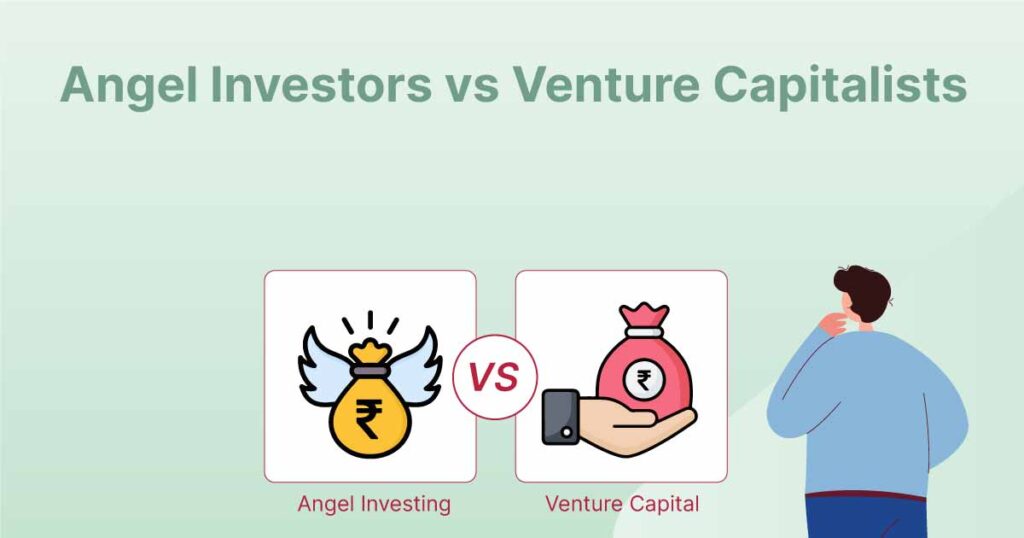What is the difference between angel investors and venture capitalists?
Introduction: Funding Your Startup Dream in India
Embarking on a new business venture in India is an exhilarating journey, filled with innovation, passion, and the potential for significant impact. However, turning a brilliant idea into a thriving business often requires a crucial ingredient: funding. Securing capital can be one of the biggest challenges for aspiring entrepreneurs. Fortunately, the Indian startup ecosystem offers various funding avenues, with Angel Investors and Venture Capitalists (VCs) being two prominent sources. But who are they, and how do they differ? Understanding the difference between angel investors and venture capitalists is absolutely critical for founders seeking investment, as it dictates who you approach, when you approach them, and what you can expect from the partnership. This knowledge is especially vital for small business owners and entrepreneurs navigating the dynamic Indian market. This post will clearly define angel investors and venture capitalists, compare their key characteristics, and help you understand which funding source might be the right fit for your startup’s current stage and future ambitions.
Understanding Angel Investors in India
Navigating the early stages of funding requires knowing the players involved. Angel investors represent a significant portion of the early-stage funding landscape and are often the first external capital source for many startups. Getting to know their profile and motivations is key before seeking their support.
For further details on the importance of structuring your business legally from the start, read about Company Registration, Opportunities, and Strategic Growth.
Who Exactly is an Angel Investor?
Angel investors are typically high-net-worth individuals (HNIs) who invest their own personal funds directly into startup companies, usually in exchange for ownership equity or convertible debt. Think of them as affluent individuals – successful entrepreneurs, seasoned executives, or professionals with significant industry experience – who have disposable capital they are willing to risk on promising early-stage ventures. Their motivations can be diverse; while the potential for high financial returns on a successful exit is a major driver, many angels are also driven by a desire to give back to the entrepreneurial community, mentor upcoming founders, share their expertise, or simply be part of an exciting new venture they believe in. They are a fundamental part of the diverse types of investors in Indian startups.
Key Characteristics of Angel Investment in the Indian Context
Angel investment has distinct features, particularly relevant within India’s burgeoning startup scene:
- Investment Stage: Angels primarily focus on the seed and early stages of a startup’s lifecycle. This could be when the business is just an idea, has a basic prototype, or is generating its first trickles of revenue (pre-revenue or early revenue).
- Source of Funds: The capital comes directly from the angel’s personal wealth, not from a managed fund.
- Investment Size: Angel investment rounds are generally smaller compared to venture capital. In India, typical ticket sizes can range anywhere from ₹5 Lakhs to ₹2 Crores, although this can vary significantly based on the angel’s capacity and the startup’s needs. Many angels also invest collectively through Angel Networks.
- Due Diligence: The process of evaluating the investment opportunity (due diligence) is typically less formal and faster than that of VCs. Angels often place significant weight on their belief in the founder’s vision, the quality of the founding team, the market potential, and sometimes, personal trust or gut feeling.
- Involvement: An angel’s involvement can vary greatly. Some prefer to be passive investors, while others take a very hands-on approach, offering valuable mentorship, strategic advice, and access to their personal networks based on their own experience.
Understanding Venture Capitalists (VCs) in India
As startups grow and require larger sums of capital to scale, they often turn to Venture Capitalists. VCs operate very differently from angel investors, managing large pools of capital and employing rigorous investment strategies.
For startups ready to make this transition, it’s crucial to understand the How to Secure Funding for Your Startup.
What Defines a Venture Capitalist Firm?
Venture Capitalists (VCs) are professional investment firms that invest other people’s money into startups and high-growth companies. They raise large pools of capital, known as funds, from various sources called Limited Partners (LPs). These LPs often include institutional investors like pension funds, insurance companies, university endowments, foundations, and high-net-worth family offices. The VC firm itself is managed by General Partners (GPs), who are the investment professionals responsible for identifying promising startups, making investment decisions, managing the portfolio companies, and ultimately generating returns for the LPs. The primary motivation for VCs is purely financial; they aim to generate significant returns (often targeting 10x or more) on their investments for their LPs, usually within a defined fund lifecycle of about 7-10 years. VCs play a crucial role alongside angels in the broader ecosystem of venture capitalists and angel investors in Indian market.
Key Characteristics of Venture Capital Investment
VC investment follows a more structured and demanding approach:
- Investment Stage: VCs typically invest in startups that are past the initial idea stage and have demonstrated some level of product-market fit or traction. This usually corresponds to post-seed, Series A, Series B, Series C, and later growth stages. They need evidence that the business model is viable and scalable.
- Source of Funds: The investment capital comes from the pooled funds raised from Limited Partners (LPs), not the personal wealth of the VC partners managing the fund.
- Investment Size: VC investments involve significantly larger amounts of capital compared to angel rounds. In India, VC rounds typically start from ₹5-10 Crores and can go up to hundreds of crores in later stages, designed to fuel rapid growth and expansion.
- Due Diligence: The due diligence process conducted by VCs is highly rigorous, structured, and extensive. It involves deep dives into the company’s financials, market size analysis, competitive landscape assessment, technology review, legal checks, customer references, and thorough evaluation of the management team. This data-driven process can take weeks or even months.
- Involvement: VCs typically take a very active role in their portfolio companies. They usually require a seat on the company’s Board of Directors, demand regular financial and operational reporting, provide strategic guidance (especially around scaling), help with key hires, and focus heavily on achieving a successful exit (like an IPO or acquisition) within their fund’s timeline.
The Core Difference Between Angel Investors and Venture Capitalists: A Head-to-Head Comparison
Let’s clearly outline the difference between angel investors and venture capitalists across key parameters, which is crucial knowledge for startups India seeking funding. Understanding these distinctions helps founders target the right type of investor at the right time.
| Feature | Angel Investors | Venture Capitalists (VCs) |
|---|---|---|
| Source of Capital | Personal Funds (Individual’s own money) | Pooled Funds (Other people’s money from LPs) |
| Investment Stage | Seed / Early Stage (Idea, Prototype, Pre-Revenue) | Growth Stage (Series A, B, C onwards, Post-Traction) |
| Typical Investment Size (India) | Smaller Checks (e.g., ₹5 Lakhs – ₹2 Crores) | Larger Checks (e.g., ₹5-10 Crores upwards) |
| Due Diligence Rigor | Less Formal, Faster, Trust/Founder-Focused | Highly Formal, Slower, Data-Driven, Extensive Analysis |
| Risk Appetite | Higher Risk on unproven concepts/teams | Calculated Risk on scalable models with proven traction |
| Decision Making | Individual Decision (by the angel) | Investment Committee / Partnership Decision |
| Involvement & Control | Often Mentorship-focused, Less Formal Control | Board Seat, Significant Influence, Formal Reporting Required |
| Return Expectations | Variable, Can be Patient Capital | High ROI Focus (e.g., 10x+), Defined Exit Timeline (7-10 yrs) |
| Motivation | Financial Return + Mentorship, Passion, Giving Back | Primarily Financial Return for LPs within Fund Lifecycle |
This table summarizes the core difference between angel investors and venture capitalists in India, highlighting why founders need distinct approaches when engaging with each group.
For more insights into setting up a robust business system, consider the Set Up An Accounting System for My Small Business.
Angel Investors vs Venture Capitalists for Startups India: Making the Right Choice
Choosing between seeking angel investment or venture capital is a critical strategic decision. The right choice depends heavily on your startup’s current stage, funding requirements, growth ambitions, and readiness for external influence. Considering angel investors vs. venture capitalists for startups India involves assessing these factors carefully.
When to Seek Angel Investment
Approaching angel investors generally makes sense when:
- You are at the very early stage of your startup – perhaps just formulating the business idea, building a minimum viable product (MVP), or conducting initial market testing.
- You need a relatively smaller amount of capital (typically under ₹2-3 Crores) to achieve specific early milestones, like building a prototype, hiring initial team members, or acquiring first customers.
- You highly value personal mentorship, industry connections, and guidance from an experienced individual who believes in your vision and is willing to offer hands-on support beyond just capital.
- Your startup might not yet have the substantial traction, detailed financial projections, or robust metrics required to pass the rigorous due diligence process of a VC firm.
- You are not yet ready to give up significant control or adopt the formal board structures and reporting requirements often associated with VC funding.
When to Approach Venture Capitalists
Turning to venture capitalists is usually more appropriate when:
- Your startup has moved beyond the initial concept phase and has achieved significant traction, such as demonstrable product-market fit, a growing customer base, and increasing revenue streams.
- You need substantial capital (typically ₹5 Crores or more) to fuel rapid growth and scaling, including expanding your team significantly, launching aggressive marketing campaigns, entering new markets, or investing heavily in technology development.
- You are prepared for and welcome formal governance structures, including establishing a board of directors, implementing rigorous financial reporting, and accepting strategic input from experienced investors focused on hyper-growth.
- Your long-term vision includes achieving a large-scale exit, such as an Initial Public Offering (IPO) or a significant acquisition by a larger company, aligning with the VC’s focus on generating substantial returns.
The Evolving Investor Landscape in India
It’s worth noting that the funding ecosystem in India is constantly evolving. Beyond traditional angels and VCs, there’s a growing spectrum of investors. Angel Networks (like Indian Angel Network, Mumbai Angels) pool resources from multiple angels, allowing for larger early-stage investments and more structured processes. Micro VCs are emerging, focusing on seed-stage deals with cheque sizes that sometimes bridge the gap between angels and larger VCs. Additionally, Corporate VCs (CVCs) – investment arms of large corporations – and Sector-Specific Funds are becoming more prominent. Understanding these nuances helps in navigating the diverse types of investors in Indian startups. Often, the funding journey is sequential: startups raise seed rounds from angels or micro VCs before approaching larger institutional VCs for subsequent growth rounds.
Conclusion: Navigating Your Funding Journey
Securing funding is a pivotal step for any ambitious startup. As we’ve explored, the difference between angel investors and venture capitalists lies fundamentally in their source of funds (personal vs. pooled), the stage at which they invest (early vs. growth), the typical size of their investments (smaller vs. larger), their due diligence processes (informal vs. rigorous), and their level of involvement and return expectations (mentorship vs. board-level strategy).
Choosing the right type of investor at the right time is not just about getting capital; it’s about finding the right partner for your specific stage and vision. Misalignments in expectations or stage-appropriateness can hinder growth. Therefore, understanding these distinctions is crucial for navigating the competitive landscape of venture capitalists and angel investors in Indian market successfully. Before pitching to any investor, carefully assess your startup’s current traction, capital needs, long-term goals, and your own willingness to accept external guidance and control. Being prepared not only increases your chances of securing funds but also sets the foundation for a productive investor relationship.
Furthermore, becoming ‘investor-ready’ goes beyond a compelling pitch deck. It requires robust financial housekeeping, clear legal structures, and adherence to compliance norms from day one. Investors, whether angels or VCs, favour startups that demonstrate professionalism and operational readiness. TaxRobo can help you build this strong foundation. Our services like Company Registration ensure your business is legally structured correctly, while our Accounting & Bookkeeping and Startup Compliance packages help maintain financial hygiene and meet regulatory requirements, making your venture more attractive to potential investors.
Frequently Asked Questions (FAQs)
Q1. What is the primary difference between angel investors and venture capitalists when it comes to risk?
Answer: The primary difference lies in whose money is at risk and when the risk is typically taken. Angel investors invest their own personal capital into very early-stage companies, often based on an idea or a prototype. This represents a higher personal risk on unproven concepts. Venture Capitalists invest other people’s money (from their LPs) usually after a startup has shown some traction or proof of concept. While still risky, VCs employ rigorous due diligence and invest in potentially scalable models to mitigate and manage risk across a portfolio, aiming for high returns on successful ventures to compensate for losses on others.
Q2. Can a startup in India raise funds from both angels and VCs?
Answer: Absolutely, yes. This is a very common funding trajectory for successful startups in India. Typically, a startup might raise its initial seed or pre-seed round from angel investors (or angel networks) to build the product and gain initial traction. Once the startup demonstrates growth and needs larger capital for scaling, it will then approach Venture Capitalists for subsequent funding rounds like Series A, Series B, and so on. Angels often provide the crucial early validation and capital, paving the way for institutional VC investment later.
Q3. Which type of investor is more common for startups India at the very beginning?
Answer: Angel investors are generally more common and accessible for startups in India at the very beginning (idea stage, pre-seed, or seed stage). This is primarily because they invest smaller amounts of capital, have a higher appetite for the inherent risk associated with unproven business models, and often make decisions based on the founding team and vision rather than extensive historical data (which early startups lack). VCs typically enter later when the business has demonstrated more concrete progress.
Q4. Do VCs provide mentorship like angel investors?
Answer: While some individual VC partners might offer valuable advice and mentorship based on their experience, their primary role and contribution differ from that of a typical hands-on angel investor. VC involvement is usually more focused on strategic direction, governance (often through a board seat), network access (for hiring, partnerships, future funding), and driving towards scalability and a profitable exit. The relationship is generally more formal and financially driven compared to the potentially more personal mentorship offered by some angel investors who might have deeper operational or domain expertise relevant to the startup’s specific challenges.
Q5. How does understanding angel investors and venture capitalists in India help my business?
Answer: Understanding the difference between angel investors and venture capitalists in India is immensely beneficial for your business strategy. It helps you:
- Target the Right Investors: Approach investors who actually invest at your specific stage and sector.
- Tailor Your Pitch: Craft your pitch deck and presentation to align with the expectations and focus areas of either angels (vision, team, early potential) or VCs (traction, scalability, market size, financial projections, exit strategy).
- Manage Expectations: Know what level of due diligence, control, and involvement to expect.
- Negotiate Better Terms: Understand typical deal structures and valuations relevant to each investor type.
- Increase Funding Success: By approaching the right investors with the right message at the right time, you significantly improve your chances of securing the capital needed to grow your business.



